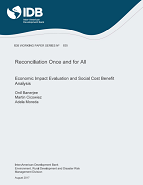Reconciliation Once and for All: Economic Impact Evaluation and Social Cost Benefit Analysis
Date
Aug 2017
There is a debate in the literature on the appropriate methods and metrics for evaluating the economic impacts of tourism investments. Available analytical techniques include input-output modelling, computable general equilibrium modelling, cost benefit analysis, expenditure-based methods, and others. Metrics of benefits often include indicators such as gross regional product, household income and measures of welfare, while the choice of appropriate metrics will in part be conditioned by from whose perspective the analysis is undertaken. In this paper, we capitalize on the strengths of general equilibrium and cost benefit analytical techniques and develop an integrated approach to evaluating public investments in tourism. We apply the approach to the evaluation of a US$6.25 million tourism investment in Uruguay from the perspective of a multi-lateral development bank and the beneficiary government. The approach developed here is powerful in that it captures first and subsequent rounds of investment impacts both on the benefits and costs side; resource diversion and constraints are accounted for, and; the estimation of benefits is consistent with the welfare economics underpinnings of cost benefit analysis.




